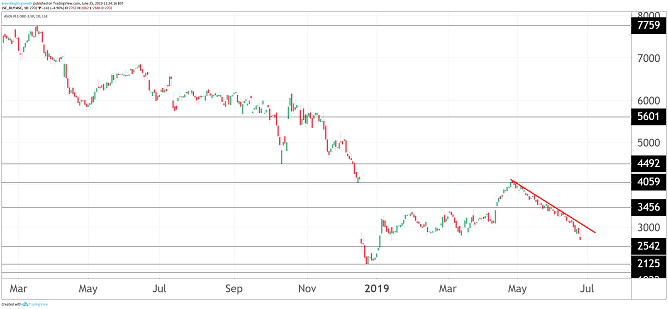
Why ASOS just dived to a multi-month low

By Graeme Evans from interactive investor.
With an impressive recovery in 2019 unwinding in spectacular fashion, how far will the shares fall?
A downgrade for ASOS (LSE:ASC) shares yesterday flagged margin pressures as the former high-flying stock attempts to drive global expansion in the face of fast-fashion rivals including Boohoo (LSE:BOO).
The note from UBS analyst Olivia Townsend suggests that recent strong top-line growth at ASOS has been at the expense of margins following changes to pricing, promotions and product “newness” over the past six months.
The broker now has a “neutral” recommendation on ASOS after lowering its target price to 3,300p from 3,500p. The switch left shares 4% lower at 2,719p as the stock continues the disappointing performance seen since peaking at over 7,700p in March 2018.

Source: TradingView Past performance is not a guide to future performance
Poor trading in the key Black Friday month of November shook confidence at the end of 2018, particularly as rival Boohoo continued to trade well on the back of the popularity of its PrettyLittleThing brand.
The jitters around ASOS haven’t been helped by a major capital expenditure programme, which has involved significant disruption and transition costs as the company looks to build a business with global scale.
This has included challenges at its new Atlanta distribution centre, which went fully online in February only to suffer teething problems when demand exceeded expectations.
UBS thinks that the US market has been the source of the margin pressure, given that recent industry data has pointed to a major repositioning on pricing.
The broker said in a note yesterday that post-promotion prices in the US are down 22% in the third quarter so far, adding that it was too early to tell whether this was due to weakness in the US or simply a new strategy that could support higher market share.
Reflecting this development, UBS is now 20 basis points below the company’s margin guidance for the current financial year. This is offset by the improving rates of customer acquisition as ASOS focuses on bringing more new stock to market and benefits from the investment in pricing.
UBS now forecasts sales growth of 17% for the year, which is stronger than the company’s guidance for 15% and the consensus estimate of 16%.
Townsend said: “We rate the shares Neutral. New evidence suggests topline growth could be underpinned by improving customer acquisition but the cost of acquisition continues to rise as higher promotions are still being used as a recruitment tool.”
UBS points out that ASOS trades with a 0.8x enterprise value to sales multiple, which is a 40% discount to European online retailer Zalando.
In half-year results in April, ASOS chief executive Nick Beighton reported sales growth of 14% but said that the company was capable of a lot more.
He pointed out that recent investment boosted confidence in the company’s ability to capture market share, as well as restore profitability and accelerate free cash flow generation.
Beighton said: “Global online fashion is a growing, £220 billion market. We now have the tech platform, the infrastructure, a constant conversation with our growing customer base who love our own great product and the constantly evolving edit of brands we present to them.
“We believe that ultimately there will only be a handful of companies with truly global scale in this market. We are determined that ASOS will be one of them.”
These articles are provided for information purposes only. Occasionally, an opinion about whether to buy or sell a specific investment may be provided by third parties. The content is not intended to be a personal recommendation to buy or sell any financial instrument or product, or to adopt any investment strategy as it is not provided based on an assessment of your investing knowledge and experience, your financial situation or your investment objectives. The value of your investments, and the income derived from them, may go down as well as up. You may not get back all the money that you invest. The investments referred to in this article may not be suitable for all investors, and if in doubt, an investor should seek advice from a qualified investment adviser.